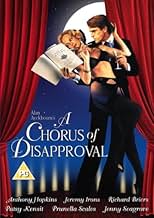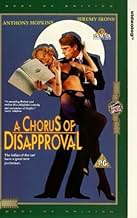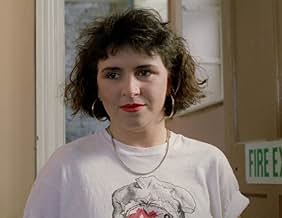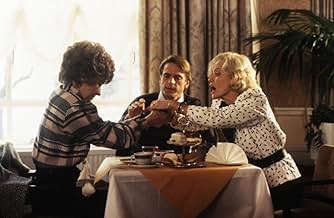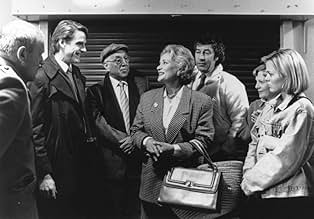अपनी भाषा में प्लॉट जोड़ेंWidower Guy is transferred to an English coastal town, where he joins an amateur operatic society to "meet people" and "have fun".Widower Guy is transferred to an English coastal town, where he joins an amateur operatic society to "meet people" and "have fun".Widower Guy is transferred to an English coastal town, where he joins an amateur operatic society to "meet people" and "have fun".
Steve Caswell
- In the audience
- (बिना क्रेडिट के)
कहानी
क्या आपको पता है
- ट्रिवियाFinal theatrical movie of Lionel Jeffries (Jarvis Huntley-Pike).
- गूफ़When Guy Jones first arrives in Scarborough and goes to his lodgings in New Steps, off Foreshore Road, he looks out of the window to admire the view of the sea and the bay. This is followed by a shot which is apparently his point of view, but it is from a point about half a mile away near the south end of Cliff Bridge.
- भाव
Dafydd Ap Llewellyn: Ian's just told me. About you and Hannah. You bastard. I just want you to know I think you're a total and utter bastard and that one of these days I hope you'll get what's coming to you.
[pause]
Dafydd Ap Llewellyn: Having said that, best of luck with the show tonight and I hope it goes really well for you.
- साउंडट्रैकThe Merry Widow
Music by Franz Lehár
English lyrics by Christopher Hassall
By Arrangement with Glocken Verlag, Ltd.
फीचर्ड रिव्यू
When I reviewed "The Revengers' Comedies" about ten years ago, I pointed out that the number of feature films based on the work of Sir Alan Ayckbourn could be counted on the fingers of one hand. That remains true today; the four that existed then ("The Revengers' Comedies", "A Chorus of Disapproval" and two by the French director Alain Resnais) have since been joined by a fifth, a Swiss version of "Season's Greetings", but no others. Sir Alan is one of Britain's most successful and prolific playwrights, with more than eighty full-length plays to his credit, most of which have been performed in London's West End and many of which have been adapted for television, but the British film industry has never taken much interest in his work.
When Guy Jones is transferred by his employers, a large electronics firm, to Scarborough, he joins the local amateur operatic society in order to make friends in the town, and becomes involved with their production of "The Beggar's Opera". Guy, a widower, begins an affair with Hannah, the neglected wife of Dafydd Ap Llewellyn, the society's autocratic Welsh stage director. Another plotline concerns a rumour that Guy's employers are considering purchasing a piece of waste ground adjacent to their factory, and several members of the society, hoping to make money from a piece of property speculation, try and obtain inside information from him. One offers him a cash bribe, and Ian Hubbard, a dodgy local businessman, tries to bribe him by offering the sexual favours of his attractive young wife Fay.
The film was directed by Michael Winner, a director whom I would not normally associate with comedy. The only other comedy of his which I have seen was "Parting Shots", a defiantly black and bad-taste, if sometimes effective, social satire, which could have been better but for some eccentric miscasting. One thing that "A Chorus of Disapproval" cannot be criticised for is the casting. The film features some of the leading lights of the British acting profession, including two major international stars in Jeremy Irons as Guy and Anthony Hopkins as Dafydd, and both play their parts perfectly well, as do most of the other cast members.
And yet I have never enjoyed the film as much as I did the original stage play when I saw it in the West End in the mid-eighties. Ayckbourn's success as a dramatist is due not merely to the quality of his plots and dialogue but also on matters which transfer less easily to the cinema screen, such as complexity of structure and his knowledge of stagecraft. (Besides being a playwright, he is also the artistic director of the Stephen Joseph theatre in Scarborough). The screenplay for "A Chorus..." is very much abridged when compared with the original play, although not as much as "The Revengers' Comedies", which was a condensation of two plays into a single film. Winner's rather heavy-handed style of direction is probably more suited to a broad satire like "Parting Shots" than it is to Ayckbourn's more subtle comedy of manners. The original stage production I saw would probably have merited a nine, but something has gone missing between stage and screen. I cannot give the film more than 6/10.
When Guy Jones is transferred by his employers, a large electronics firm, to Scarborough, he joins the local amateur operatic society in order to make friends in the town, and becomes involved with their production of "The Beggar's Opera". Guy, a widower, begins an affair with Hannah, the neglected wife of Dafydd Ap Llewellyn, the society's autocratic Welsh stage director. Another plotline concerns a rumour that Guy's employers are considering purchasing a piece of waste ground adjacent to their factory, and several members of the society, hoping to make money from a piece of property speculation, try and obtain inside information from him. One offers him a cash bribe, and Ian Hubbard, a dodgy local businessman, tries to bribe him by offering the sexual favours of his attractive young wife Fay.
The film was directed by Michael Winner, a director whom I would not normally associate with comedy. The only other comedy of his which I have seen was "Parting Shots", a defiantly black and bad-taste, if sometimes effective, social satire, which could have been better but for some eccentric miscasting. One thing that "A Chorus of Disapproval" cannot be criticised for is the casting. The film features some of the leading lights of the British acting profession, including two major international stars in Jeremy Irons as Guy and Anthony Hopkins as Dafydd, and both play their parts perfectly well, as do most of the other cast members.
And yet I have never enjoyed the film as much as I did the original stage play when I saw it in the West End in the mid-eighties. Ayckbourn's success as a dramatist is due not merely to the quality of his plots and dialogue but also on matters which transfer less easily to the cinema screen, such as complexity of structure and his knowledge of stagecraft. (Besides being a playwright, he is also the artistic director of the Stephen Joseph theatre in Scarborough). The screenplay for "A Chorus..." is very much abridged when compared with the original play, although not as much as "The Revengers' Comedies", which was a condensation of two plays into a single film. Winner's rather heavy-handed style of direction is probably more suited to a broad satire like "Parting Shots" than it is to Ayckbourn's more subtle comedy of manners. The original stage production I saw would probably have merited a nine, but something has gone missing between stage and screen. I cannot give the film more than 6/10.
- JamesHitchcock
- 5 नव॰ 2022
- परमालिंक
टॉप पसंद
रेटिंग देने के लिए साइन-इन करें और वैयक्तिकृत सुझावों के लिए वॉचलिस्ट करें
- How long is A Chorus of Disapproval?Alexa द्वारा संचालित
विवरण
- रिलीज़ की तारीख़
- कंट्री ऑफ़ ओरिजिन
- भाषा
- इस रूप में भी जाना जाता है
- Alles nur Theater
- फ़िल्माने की जगहें
- उत्पादन कंपनियां
- IMDbPro पर और कंपनी क्रेडिट देखें
बॉक्स ऑफ़िस
- US और कनाडा में सकल
- $2,16,373
- दुनिया भर में सकल
- $2,16,373
इस पेज में योगदान दें
किसी बदलाव का सुझाव दें या अनुपलब्ध कॉन्टेंट जोड़ें

टॉप गैप
By what name was A Chorus of Disapproval (1989) officially released in Canada in English?
जवाब

